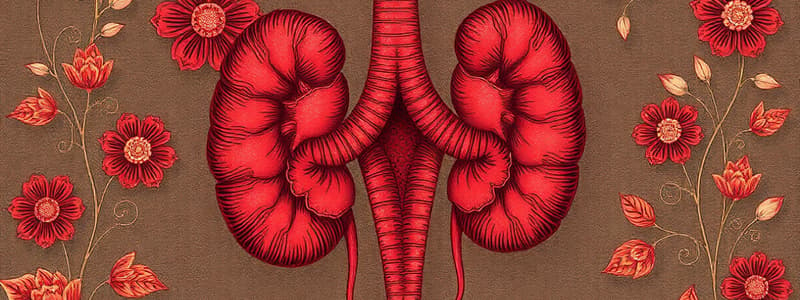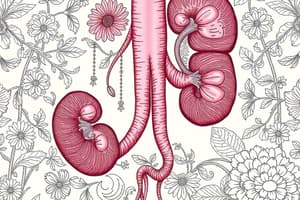Podcast
Questions and Answers
What is a primary cause of upper urinary tract obstruction?
What is a primary cause of upper urinary tract obstruction?
- Prostate enlargement
- Nephrolithiasis (correct)
- Bladder dysfunction due to diabetes
- Urethral stricture
Which condition is most likely to cause lower urinary tract obstruction in older males?
Which condition is most likely to cause lower urinary tract obstruction in older males?
- Hydronephrosis
- Nephrolithiasis
- Congenital anomalies
- Prostate enlargement (correct)
How does obstruction affect the glomerular filtration rate (GFR)?
How does obstruction affect the glomerular filtration rate (GFR)?
- It causes an increase in GFR due to increased pressure
- It has no effect on GFR
- It reduces GFR by increasing intraluminal pressure (correct)
- It causes GFR to fluctuate unpredictably
What might result from prolonged urinary tract obstruction?
What might result from prolonged urinary tract obstruction?
What condition may result from the compression of the renal cortex and medulla?
What condition may result from the compression of the renal cortex and medulla?
Which of the following could be a cause of upper urinary tract obstruction due to external factors?
Which of the following could be a cause of upper urinary tract obstruction due to external factors?
What is a significant risk factor for urinary tract infections (UTIs) due to stagnant urine?
What is a significant risk factor for urinary tract infections (UTIs) due to stagnant urine?
Which condition is characterized by narrowing of the urethra, often due to trauma or infection?
Which condition is characterized by narrowing of the urethra, often due to trauma or infection?
What anatomical changes occur in the kidneys due to hydronephrosis?
What anatomical changes occur in the kidneys due to hydronephrosis?
Which of the following is a possible outcome of unilateral kidney obstruction?
Which of the following is a possible outcome of unilateral kidney obstruction?
In which group is pelvic organ prolapse most commonly associated?
In which group is pelvic organ prolapse most commonly associated?
Which factors do NOT relate to the risk of urinary tract obstructions?
Which factors do NOT relate to the risk of urinary tract obstructions?
What is a common cause of infections secondary to urinary tract obstructions?
What is a common cause of infections secondary to urinary tract obstructions?
What demographic is most likely at risk for nephrolithiasis (kidney stones)?
What demographic is most likely at risk for nephrolithiasis (kidney stones)?
Which condition is characterized by the presence of large volumes of stagnant urine?
Which condition is characterized by the presence of large volumes of stagnant urine?
What is the risk associated with a high intake of sodium, oxalate, or animal protein?
What is the risk associated with a high intake of sodium, oxalate, or animal protein?
Flashcards
Urinary Tract Obstruction
Urinary Tract Obstruction
A narrowing or blockage of the urinary tract, preventing urine flow.
Renal Atrophy
Renal Atrophy
Loss of kidney function due to compression or damage.
Urinary Tract Infection (UTI)
Urinary Tract Infection (UTI)
Infection in the urinary tract, often caused by stagnant urine.
Compensatory Hypertrophy
Compensatory Hypertrophy
Signup and view all the flashcards
Renal Fibrosis
Renal Fibrosis
Signup and view all the flashcards
Nephrolithiasis
Nephrolithiasis
Signup and view all the flashcards
Prostate Enlargement
Prostate Enlargement
Signup and view all the flashcards
Pelvic Organ Prolapse
Pelvic Organ Prolapse
Signup and view all the flashcards
Hydronephrosis
Hydronephrosis
Signup and view all the flashcards
Nephrolithiasis (Kidney Stones)
Nephrolithiasis (Kidney Stones)
Signup and view all the flashcards
Congenital Anomalies in the Urinary Tract
Congenital Anomalies in the Urinary Tract
Signup and view all the flashcards
Compression of the Urinary Tract
Compression of the Urinary Tract
Signup and view all the flashcards
Urethral Stricture
Urethral Stricture
Signup and view all the flashcards
Bladder Dysfunction (Neurogenic Bladder)
Bladder Dysfunction (Neurogenic Bladder)
Signup and view all the flashcards
Study Notes
Urinary Tract Obstructions
- Urinary tract obstructions are blockages that impede urine flow, affecting areas from the renal pelvis to the urethra. Classifications include upper and lower urinary tract obstructions.
Causes of Upper Urinary Tract Obstruction
- Nephrolithiasis (Kidney Stones): Formation of crystals (calcium oxalate, calcium phosphate, uric acid, or struvite) in kidneys or ureters.
- Congenital Anomalies: Structural abnormalities in the urinary tract.
- Compression of the Urinary Tract: Tumors, pregnancy, or fibrous tissue around ureters.
Causes of Lower Urinary Tract Obstruction
- Prostate Enlargement (BPH): Common in older males.
- Urethral Stricture: Narrowing of the urethra due to infection, trauma, or scar tissue.
- Pelvic Organ Prolapse: In females, organs like the bladder, rectum, or uterus may prolapse, obstructing the bladder.
- Bladder Dysfunction (Neurogenic Bladder): Neurological conditions impair bladder contraction.
Pathophysiology of Urinary Tract Obstructions
- Blockage and Pressure Increase: Urine accumulates upstream, increasing intraluminal pressure, especially in Bowman's capsule, reducing glomerular filtration rate (GFR), and potentially decreasing kidney function. The longer the blockage lasts, the greater risk for damage, including hydronephrosis (kidney swelling).
- Hydronephrosis: Dilation of the renal pelvis and calices due to urine backup, causing kidney damage over time.
Infection and Urinary Stasis
- Urine stasis (stagnant urine) increases the risk of urinary tract infections (UTIs).
Compensatory Changes
- If only one kidney is affected, the unaffected kidney compensates to maintain function. Long-term obstructions may lead to renal fibrosis and irreversible kidney damage.
Disease Transmission
- Urinary tract obstructions are not infectious. However, infections from bacteria like E. coli can secondary to obstructions.
Risk Factors for Upper Urinary Tract Obstruction
- Nephrolithiasis (Kidney Stones): Age, Gender, Race, Geographic location, Climate, Dietary factors, Medical Conditions (hyperparathyroidism, metabolic disorders).
Risk Factors for Lower Urinary Tract Obstruction
- Prostate Enlargement (BPH): Age >50, particularly in those with BPH.
- Pelvic Organ Prolapse: Multiple pregnancies or pelvic surgeries increase risk.
Other Relevant Information
- Urethral Stricture: Scar tissue from trauma, infection, or surgery.
- Neurogenic Bladder: Conditions like spinal cord injuries, multiple sclerosis (MS), or stroke impair bladder control.
Studying That Suits You
Use AI to generate personalized quizzes and flashcards to suit your learning preferences.



![[PPT] Urinary and Renal Disorders](https://assets.quizgecko.com/cdn-cgi/image/width=300,height=200,fit=crop,quality=75,format=webp/quiz/e3147ee7c05bc213f1834c6d9ce58e42.jpg)